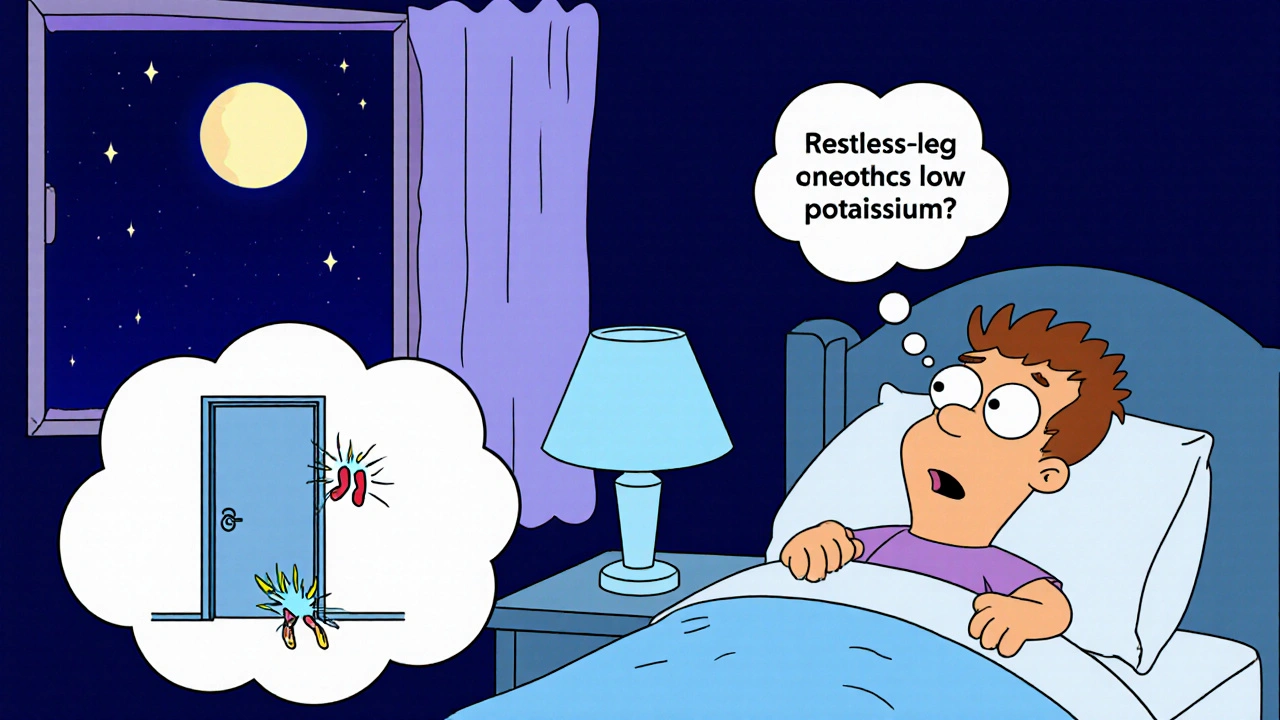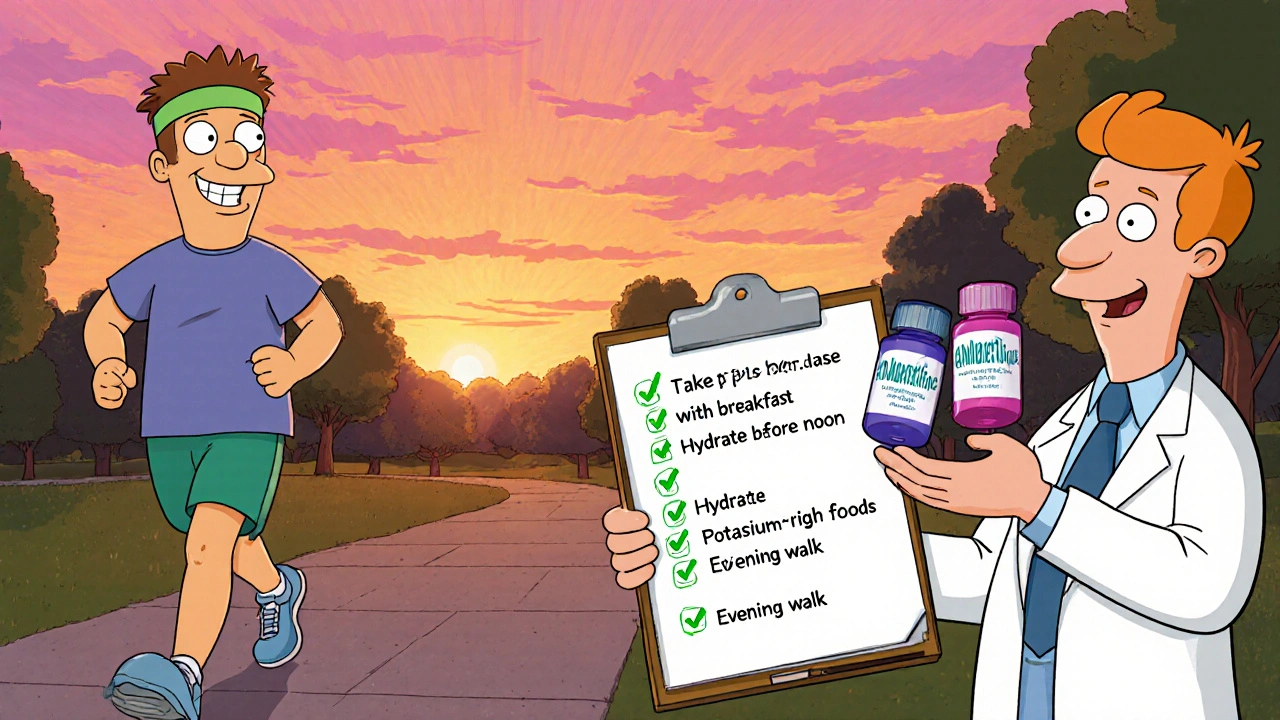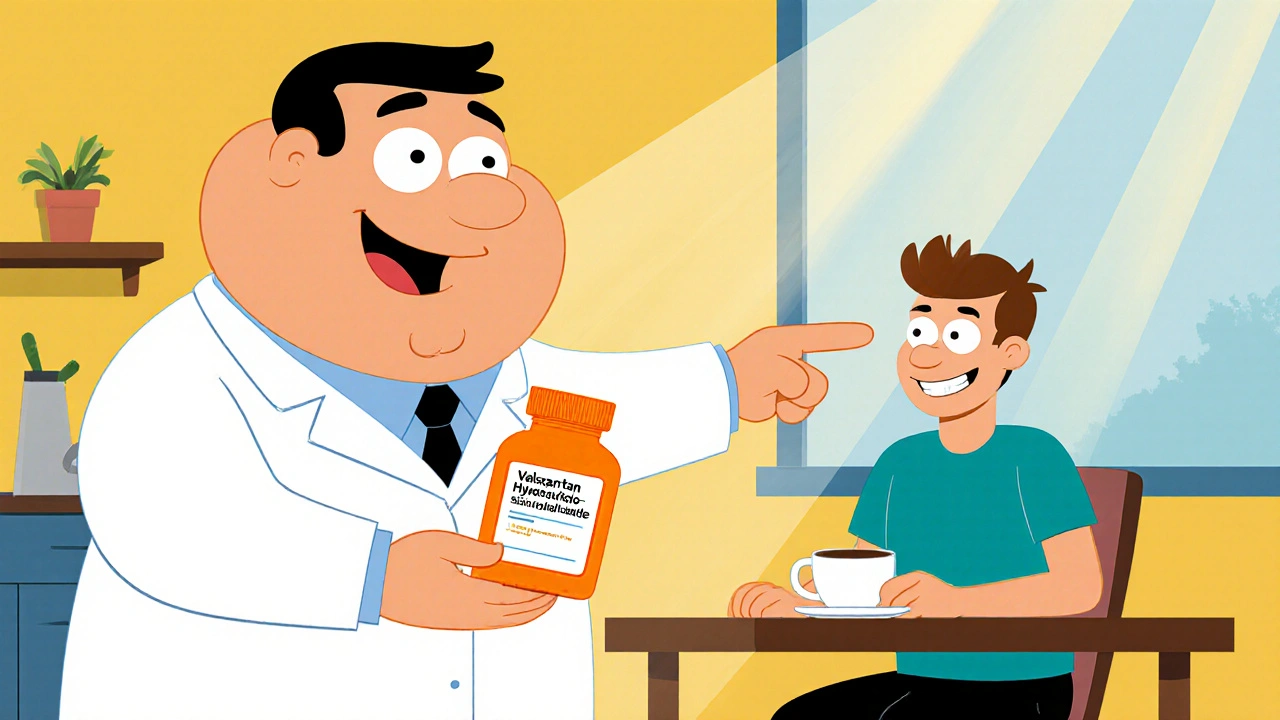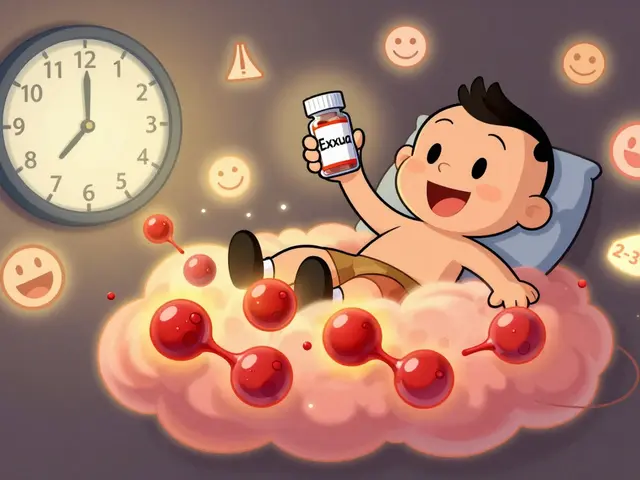Quick Takeaways
- Valsartan-hydrochlorothiazide (V/H) can affect sleep through nocturia, electrolyte shifts, and occasional insomnia.
- Timing your dose, staying hydrated early in the day, and monitoring electrolytes often reduce night‑time problems.
- Talk to your clinician if you notice persistent fatigue, vivid dreams, or trouble falling asleep.
- Alternative antihypertensives with lower sleep‑impact are available if lifestyle tweaks don’t help.
What Is Valsartan‑Hydrochlorothiazide?
When you see a prescription labeled Valsartan‑Hydrochlorothiazide is a fixed‑dose combination of an angiotensin II receptor blocker (ARB) and a thiazide diuretic used to lower blood pressure. Valsartan blocks the hormone angiotensin II, preventing vessels from tightening, while hydrochlorothiazide helps the kidneys flush extra salt and water. Together they give a stronger, more consistent drop in systolic and diastolic pressures than either drug alone.
How V/H Interacts With Your Sleep Cycle
Sleep isn’t just a passive state; it relies on stable fluid balance, steady blood pressure, and proper electrolyte levels. V/H can touch each of these areas:
- Nocturia - The diuretic part makes you pee more, especially within the first few hours after a dose.
- Electrolyte shifts - Lower potassium or magnesium can cause muscle cramps or restless legs at night.
- Blood‑pressure dip - If your pressure falls too low while you’re lying down, you may feel light‑headed or wake up briefly.
- Central nervous system effects - Rarely, ARBs have been linked to vivid dreams or mild insomnia.
All of these mechanisms can turn a good night’s rest into a series of interruptions.
Common Sleep‑Related Side Effects
People on V/H often report one or more of the following:
- Nocturnal trips to the bathroom (nocturia) - especially if the tablet is taken after lunch.
- Insomnia or difficulty falling asleep - usually mild, but can be worsened by anxiety about blood‑pressure numbers.
- Restless leg‑like sensations - linked to low potassium or magnesium.
- Fatigue or grogginess - a consequence of low night‑time blood pressure.
- Vivid or abnormal dreams - reported in a small subset of ARB users.

Managing Sleep Problems While Staying on V/H
Most sleep disruptions can be handled without stopping the medication. Here are practical steps that work for many patients:
1. Adjust Dose Timing
Take V/H in the morning, ideally with breakfast. If your doctor advises a split dose, keep the larger portion early in the day and the smaller one before dinner-never within three hours of bedtime.
2. Hydration Strategy
Drink most of your fluids before noon. A glass of water in the evening is fine, but avoid large amounts after 6 p.m. This reduces the overnight bathroom urge.
3. Watch Electrolytes
Ask your clinician for a basic electrolyte panel after the first month. If potassium is low, add a potassium‑rich food (banana, avocado) or a low‑dose supplement.
4. Light‑Exercise Routine
A brisk 20‑minute walk after dinner can lower blood pressure gradually, easing the night‑time dip and improving sleep depth.
5. Sleep‑Friendly Environment
Keep the bedroom cool (around 65 °F), dim lights an hour before bed, and limit screen exposure. These habits support the natural melatonin rise that helps you fall asleep.
6. Review Other Medications
Stimulants, decongestants, or certain antidepressants can add to insomnia. Discuss a medication review with your pharmacist.
When to Consider an Alternative
If you’ve tried timing, hydration, and electrolyte tweaks for at least four weeks and still wake up multiple times, it may be time to explore other blood‑pressure options. Some alternatives known for milder sleep impact include:
- Losartan (an ARB without a built‑in diuretic) - often taken once daily.
- Amlodipine (a calcium‑channel blocker) - less likely to cause nocturia.
- Low‑dose thiazide‑only therapy - if the ARB component is the main sleep trigger.
Switching should always involve your prescriber, as blood‑pressure control is critical for long‑term heart health.
Quick Reference: Sleep‑Side‑Effect Comparison
| Medication | Primary Class | Nocturia | Insomnia / Vivid Dreams | Electrolyte Impact |
|---|---|---|---|---|
| Valsartan‑Hydrochlorothiazide | ARB + Thiazide | High (dose‑dependent) | Low‑moderate | ↓ Potassium, ↓ Magnesium |
| Losartan | ARB | Low | Low | Minimal |
| Amlodipine | Calcium‑channel blocker | Low | Low‑moderate (rare) | Minimal |
| Hydrochlorothiazide (alone) | Thiazide diuretic | High | Low | ↓ Potassium, ↑ Uric acid |

When to Call Your Doctor
Set an alarm for a follow‑up if you notice any of these red flags:
- Waking up more than three times a night for the same reason over two weeks.
- Persistent fatigue that interferes with work or daily chores.
- Muscle cramps, especially in calves, that don’t improve with potassium‑rich foods.
- Swelling, sudden weight gain, or dizziness-signs of electrolyte imbalance.
These symptoms may need a dose adjustment, a lab check, or a switch to another drug.
Bottom Line
While Valsartan‑Hydrochlorothiazide sleep issues are common, they’re usually manageable with a few timing and lifestyle tricks. Understanding how the ARB and the diuretic each play a role helps you target the right fix. If simple tweaks don’t work, a conversation with your prescriber about alternative agents can safeguard both your heart and your night’s rest.
Frequently Asked Questions
Can Valsartan‑Hydrochlorothiazide cause severe insomnia?
Severe insomnia is rare. Most users experience mild difficulty falling asleep, which often improves after the body adjusts to the medication. If insomnia persists beyond a month, talk to your doctor.
Why do I wake up multiple times to pee after starting V/H?
Hydrochlorothiazide is a diuretic, so it increases urine production. Taking the pill earlier in the day and limiting fluids after dinner usually reduces nighttime trips.
Should I stop V/H if I feel constantly tired?
Don’t stop abruptly. Fatigue can stem from low night‑time blood pressure or electrolyte loss. Check labs, adjust dosing time, or discuss a switch with your clinician before making any changes.
Is a potassium supplement safe with V/H?
A low‑dose potassium supplement (often 20‑40 mEq) is safe for most people, but it should be taken under medical supervision to avoid hyper‑kalemia, especially if you have kidney issues.
Are there non‑drug ways to control my blood pressure and improve sleep?
Yes. Regular aerobic exercise, a DASH‑style diet, weight control, stress‑reduction techniques, and limiting caffeine after noon can lower blood pressure and support better sleep without medication changes.




Ekeh Lynda
October 24, 2025 AT 12:52V/H combines a blood pressure blocker with a diuretic and that mix can mess with your night. The diuretic pushes fluid out early and that leads to trips to the bathroom after you lie down. If you take the pill after lunch the urine production peaks in the evening. More trips mean more awakenings and less deep sleep. The ARB part can shift electrolytes like potassium and magnesium. Low potassium can give you restless leg sensations that keep you tossing. Some people notice vivid dreams that feel too real. Blood pressure can dip too low when you are horizontal and that causes light headed moments. All these mechanisms add up to a fragmented night. The good news is you can tweak timing to reduce the impact. Taking the dose with breakfast gives the body time to clear the excess fluid before bedtime. Hydrating early in the day and cutting drinks after six p.m. also cuts nocturia. A simple blood test after a month can reveal if you need potassium supplements. Adding a banana or an avocado can raise potassium without a prescription. If the symptoms persist after four weeks you should talk to your clinician about alternative agents. Options include an ARB without a diuretic or a calcium channel blocker that does not increase urine output. Keeping a sleep diary helps you see which changes make the biggest difference.
Mary Mundane
November 2, 2025 AT 18:05Take V/H in the morning and limit fluids after dinner to curb nocturia; it works for most patients.
Tammy Watkins
November 12, 2025 AT 00:19From a clinical perspective the timing of an ARB‑thiazide combination warrants precise scheduling. Administering the medication before breakfast aligns the diuretic peak with daytime activity and mitigates nocturnal polyuria. Moreover, evaluating serum potassium and magnesium at the six‑week mark enables targeted supplementation before adverse neuromuscular symptoms emerge. Should the patient experience persistent vivid dreams, a dose reduction or a switch to a monotherapy ARB may be warranted. Thus, a structured approach integrating chronotherapy, laboratory monitoring, and patient education optimizes both cardiovascular control and sleep quality.
Dawn Bengel
November 21, 2025 AT 06:32If you’re not drinking enough water early, you’re just sabotaging your own health 🇺🇸.
junior garcia
November 30, 2025 AT 12:45I get it the balance is tough but you can win the night if you follow the plan.
Dason Avery
December 9, 2025 AT 18:59Remember that every night is a chance to reset your body’s rhythm; the mind that expects restful sleep often creates it. Embrace the small victories of fewer bathroom trips and let that confidence fuel better health. In the grand scheme, a healthy heart and a calm mind are partners on the same journey. Keep moving forward and trust the process 😊.
Casey Morris
December 19, 2025 AT 01:12Well, you’ve made a point, but let’s look at the data; the evidence shows that timing and fluid management are the real heroes, not a patriotic shrug. Honestly, you could try the simple steps before blaming yourself, and you’ll see a noticeable improvement; it’s almost always that straightforward. Keep in mind that we’re all here to help each other, so let’s share what works rather than judge.
Doreen Collins
December 28, 2025 AT 07:25It’s understandable to feel frustrated when your blood pressure meds start interrupting your sleep, but you’re not alone in this battle. Many patients report similar nighttime awakenings and the good news is that practical adjustments often make a big difference. Start by taking your V/H dose with your first meal of the day and keep a water bottle handy until lunch; after that, sip only if you’re really thirsty. Pair this routine with a light evening walk to gently lower your pressure and calm your nervous system. Adding potassium‑rich foods like bananas, oranges, or leafy greens can also smooth out restless‑leg sensations. If you keep a simple log of bedtime, wake‑up times, and bathroom trips you’ll quickly spot patterns that you can tweak. Should these steps not bring relief within a month, schedule a follow‑up to discuss alternative medications that have a gentler sleep profile. Remember, small consistent changes often lead to the biggest improvements over time.
HILDA GONZALEZ SARAVIA
January 6, 2026 AT 13:39The sleep‑side‑effect table you referenced is spot on, and it’s worth noting that Losartan’s low nocturia profile stems from its lack of a diuretic component. If you decide to switch, a gradual cross‑taper over two weeks can prevent rebound hypertension. Also, consider checking your magnesium levels; low magnesium can amplify restless‑leg feelings even if potassium looks fine. A short nightly stretching routine can further reduce leg discomfort and promote deeper REM cycles. Keep communicating with your pharmacist-they can flag any hidden interactions with over‑the‑counter supplements. By integrating these steps you’ll likely see a smoother night and steadier blood pressure.